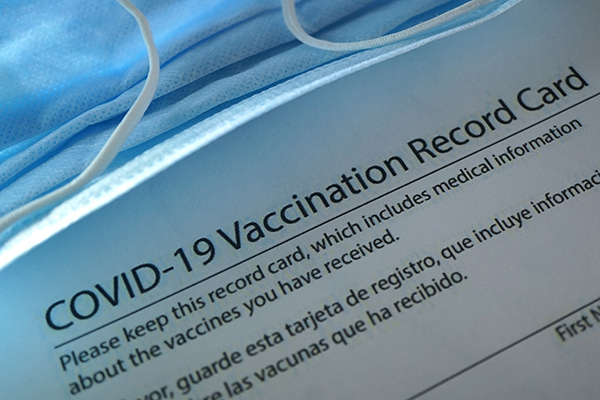Volume 24 | Issue 1

By Lisa Gingeleskie, Esq., Lindabury, McCormick, Estabrook & Cooper, P.C.
As employers look to reopen their doors following the COVID-19 pandemic, many are faced with a variety of legal questions concerning the issuance of mandatory vaccinations and other workplace safety protocols. To minimize liability and best address these legal challenges, it is critical that employers are aware of both their rights and obligations under state and federal law before bringing employees back into the workplace.
In the absence of any state law to the contrary, employers are free to mandate vaccinations in the workplace. When making this decision, however, employers must first determine whether a mandated vaccine policy is necessary given the nature of their workplace. For example, certain service industries (i.e. restaurants) may feel compelled to mandate vaccinations in order to appear safer and therefore more attractive to their public clientele. Conversely, other industries may find that mandating vaccines may have a negative impact on employee morale and therefore decide to simply encourage their employees to vaccinate. Employers must carefully engage in a cost-benefit analysis tailored to the nature of their specific business when deciding whether to impose a mandatory vaccine policy.
If an employer does mandate vaccinations, the Equal Employment Opportunity Commission (“EEOC”) has stated that employers may require proof of vaccination without implicating the Americans With Disabilities Act’s (“ADA”) restrictions on “disability-related inquires.” The EEOC observed that there may be many reasons to explain why an employee has not been vaccinated that may or may not be disability-related. Thus, merely requiring proof of one’s vaccination status is not likely to elicit information about a disability and should not run afoul of the ADA’s restrictions. However, the EEOC cautioned that follow-up inquires such as asking why the employee did not receive the vaccine “may elicit information about a disability and would be subject to the pertinent ADA standard that [such questions] be ‘job-related and consistent with business necessity.’”
If a mandatory vaccination policy is adopted, employers must be prepared to recognize two exceptions to this policy. First, mandated vaccinations may tend to screen out disabled individuals who cannot be vaccinated for medical reasons. To survive a disability discrimination claim under the ADA, an employer must show that the excluded individual would pose a “direct threat” to the workplace due to a “significant risk of substantial harm to the health or safety of the individual or others” that cannot be eliminated by reasonable accommodations. EEOC guidance notes that a direct threat includes a determination that an unvaccinated individual would expose others to the virus. If reasonable accommodations to eliminate the risk of COVID-19 exposure including providing additional personal protection equipment or permitting remote working arrangements, cannot be implemented without “undue hardship” to the employer, the unvaccinated employee can be excluded from the workplace. The EEOC guidance cautions that the prevalence of vaccinated employees in the workplace and the amount of contact the unvaccinated individual will have with others including customers whose vaccination status could be unknown, should be considered before the employer concludes that accommodation would result in undue hardship.
Secondly, an employee may claim that sincerely held religious beliefs prevent him or her from receiving the vaccination. As with the duty to provide reasonable accommodations for disabilities under the ADA, Title VII requires employers to reasonably accommodate religious beliefs unless the employer determines that doing so would pose an undue hardship.
Employers should also consider specific mandates in their respective states. For example, Effective May 28, 2021, New Jersey Governor Murphy’ s Executive Order lifted the mask and social distancing requirements for most indoor worksites that are open to the public. Effective June 4, 2021, mask and social distancing requirements in private indoor workplaces were also lifted pursuant for “fully vaccinated” employees as defined by the CDC. However, if the employer is unable to verify an employee’s vaccination status it must require that employee to continue to wear a mask and maintain social distance protocols. These Orders make it clear that businesses have the option to impose stricter requirements for mask-wearing and social distancing, but shall not restrict employees or patrons from wearing masks if they chose to do so.
While these Executive Orders are a promising step in the direction of a return to “normal,” it is important to remember that these changes do not fully put employers back to pre-pandemic workplace conditions. Given the complexities of the issues surrounding compliance with ever-changing safety protocols, it is recommended that employers consult with employment counsel to engage in a thorough legal assessment of the workplace prior to reopening one’s doors.

Lisa Gingeleskie, Esq., is a labor and employment attorney with Lindabury, McCormick, Estabrook & Cooper, P.C. (www.lindabury.com). Based in Westfield, NJ, Lindabury serves clients, including prominent corporations and businesses, throughout the Mid-Atlantic region.
Scott Ellyson, CEO of East West Manufacturing, brings decades of global manufacturing and supply chain leadership to the conversation. In this episode, he shares practical insights on scaling operations, navigating complexity, and building resilient manufacturing networks in an increasingly connected world.